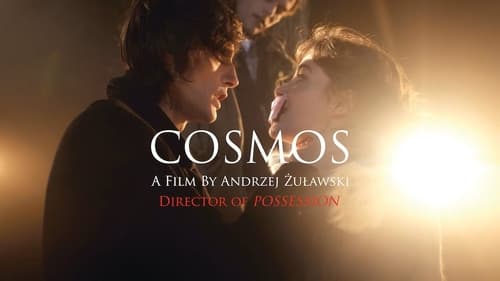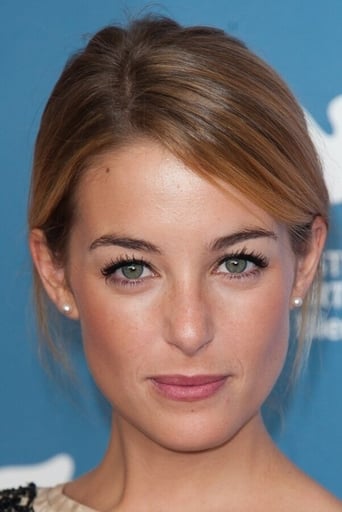Jeanskynebu
the audience applauded
Greenes
Please don't spend money on this.
Bergorks
If you like to be scared, if you like to laugh, and if you like to learn a thing or two at the movies, this absolutely cannot be missed.
Calum Hutton
It's a good bad... and worth a popcorn matinée. While it's easy to lament what could have been...
christopher-underwood
Unique film that is not, surprisingly, difficult to watch but certainly impossible to follow in any coherent way. Based upon the absurdist writings of Witold Gombrowicz this is more a test and strain upon the actors than the viewer. It is not just that not very much makes sense in the traditional way but that even the very language is distorted and invented. At first it seems there is something wrong with the sound, the subtitling or your brain but gradually, because the acting is so strong and capable and the direction so unrelentingly assured, we have to simply accept everyone and their actions and words for what they are. Essentially this is at times gibberish but gradually, like in some crazy dreams certain believability envelops one into the whole madhouse before us. It helps that the film always looks good and that even the most seemingly stupid utterance is convincing. When the absurdist movement is seen in the context of the wider world as a political statement and more specifically here as a reaction to the stark grey lies of the Soviet Union, this colourful absurd creation from a Pole is like a flower in the desert. You will be glad to have seen this film even if it has you scratching your head for a while - if not the whole duration!
Mike Olson
Andrzej Zulawski called Cosmos "...one of the strangest films I've ever seen in my life." And then he added, "And incidentally, I made it." Or as David Cairns says in his introductory comments for the included video essay, "What the actual f---, you may be thinking, if this has been your first exposure to a film by Andrzej Zulawski, or even if you are a veteran of his demented, ecstatic cinema."It's complete and utter madness. Characters seemingly on the brink of insanity, or having already slipped over the edge, engage in dialogue and actions that, as a viewer, we assume means something...to THEM. But are they really communicating with each other and with us? Yes, I think so. A form of systematic expounding one would suppose, at times with raw emotions, yet coming across as disconnected and elusive ideas the meaning of which keeps us searching and in the moment. But it's a form of communication nonetheless. It's what it makes us feel, what insights we gain from the whole. And with Cosmos it's all enhanced by some pretty fine cinematography as well.The nonsensical dialogue, the frenzied performances. He may have slowed down just a bit by the time he made this film but this is trademark, spot-on Zulawski. What he has always given to me is a unique experience. Cosmos is enjoyable madness, very weird, and a beautiful film. This is a fitting final episode in an amazing career unlike any other.
elinguation
A couple of guys show up at a guesthouse in the French countryside and inexplicable events begin to occur. The most troubling of these are the hangings in the garden - first a bird, then a chicken, then a piece of wood, then a cat. It all seems to point toward some meaning or intention that remains consistently out of reach in spite of an unending stream of word salad in which the characters invoke various philosophers and writers, make Donald Duck sounds, speak in pseudo-Latin gibberish, and utter puns that always manage to slightly edge around being funny. Slugs appear in the food. In one particularly memorable scene, the unhinged guesthouse patron spills a bowl of peas on the ground, and the characters crawl around and make a big mess while shrieking at one another. Everyone is sleeping with everyone. One character is writing a novel, but this proves another fruitless attempt to make sense of senselessness, as he should probably already know it will based on his repeated references to J.P. Sartre. Etcetera. There's no plot to speak of, so I'm trying to give a sense of the texture of the film.It should be clear that this is a truly left-field piece of cinema whose main concern is the absurd. I feel that it's quite well made and that Zulawski is a talented director. But here my praise of the film must stop. It's useful to compare it to Possession, another Zulawski film that has proved his most enduring. Personally I found that film engaging and unique - certainly the outrageously grotesque visual imagery makes an immediate impression - but was annoyed by the constant stream of pseudo-intellectual dialogue. It didn't add anything to the film, except as a comment on the impossibility of making sense of any of the weirdness presented on screen. Perhaps on that level the constant rumination was effective, but I found it annoying and felt it was already clear that the images didn't make any sense, so the commentary was redundant. It would have been more effective to focus on the potent imagery, leading the viewer on an impossible search for meaning instead of having the characters verbalize the fruitlessness of that search for two hours.Cosmos is more verbalization, more rumination, streams of it, mountains of it. The weird visual imagery in this film is more subdued. It's clear that the images of the hangings, the slugs in the food, are building on one other in some sort of weirdly nonsensical, jaggedly poetic way. But not enough is made of them. I personally found it frustrating to watch this particular film about absurdity and meaninglessness and found myself thinking about other films about absurdity and meaninglessness that somehow manage to be emotionally engaging instead of just absurd and meaningless. For instance, I would point toward the Spanish film Arrebato. It descends into similar wormholes of repetitive, addictive thinking and questioning of the unstable nature of reality while getting under the viewer's skin with disturbing images and a plot that builds toward the inevitable conclusion of existential obliteration. In this case, if the director has nothing to say but nothing, what is the justification for the film's existence? As I said, I don't doubt the skill with which this film was made. I simply question its necessity. And no one on earth is going to find it entertaining.The end credits show the film set being taken apart. I don't think this is a spoiler: this is a film that works from the opening scene to disassemble itself. If that's what you want to see, go for it. I even had the thought, while I was watching this, that it is the sort of film that has multiple layers that will probably only be revealed on repeated viewings. But once was enough for me. If you want to see a film that does what this film does, only better, see Possession. For me, this is a film that will stick in your craw, nagging to be explained, and perhaps that's praiseworthy. I simply don't find it likable at all and therefore won't recommend it.Death. Sex. Stains on the wall that might mean something. J.P. Sartre. I'm writing a novel. Icicle, bicycle. Peas on the ground. Tririri. If you want more, go ahead and see this.
Tom Dooley
Cosmos starts with two friends trying to get away from it all. One is Witold who has flunked his law exam and the other is Fuchs who has just packed in working for a Parisian fashion house. They head off to some seaside resort to a family run guest house. This family run guest house is from the more bizarre end of the market, the sort that gets very mixed reviews on Trip Adviser. For starters things are slightly awry from the start, with dead birds found hanging and staffed by people who are so emotionally unstable that a Ritalin overdose would, possibly, have little effect.The backgrounds of the two young men are juxtaposed brilliantly to the mayhem that is going on around them. Witold seems to be a frustrated dilettante and writer who is wont to fall in love and Fuchs is a force of nature who sparkles with a misplaced energy – if such a thing really exists. The increasing madness seems to deliberately challenge any form of acceptable narrative whilst telling stories that will, eventually, add up to the whole. This will not be a film for everyone; it can be seen as 'art house' or even deliberately annoying, but when you peel back the layers there is so much here that it is actually a celluloid feast. The performances are at once over the top and sensational as well as being sensationalist. Jean-François Balmer as Leon the patriarch of the house is just sublime as is his screen wife - Sabine Azéma. But the real star is writer and director Andrzej Zulawski who sadly died in February. As far as a Swan song could go it would be hard to beat such a piece of original work as this – he will be truly missed. If you like cinema that challenges convention and has its heart firmly planted on its, over acting, sleeve then be prepared for a treat.





